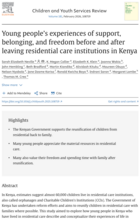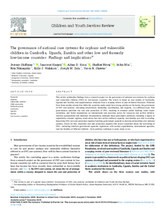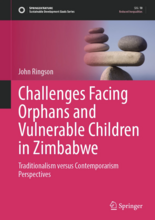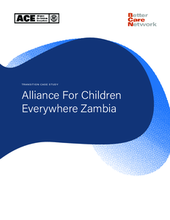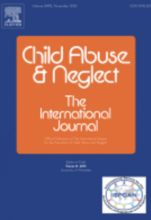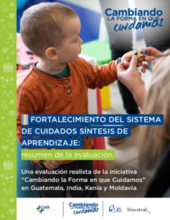Displaying 1 - 10 of 1617
In Kenya, young people’s experiences of residential care and life after leaving care highlight trade-offs between material support, emotional guidance, and personal freedom. The study emphasizes that family strengthening and individualized case management are crucial to support children reunifying with families and successfully transitioning out of residential care.
This article examines how national care systems for orphans and vulnerable children in Cambodia, Uganda, and Zambia are governed, drawing on case studies and a review of existing research. It highlights the gap between strong policy commitments and weak on-the-ground implementation, pointing to historical, political, and capacity-related factors that hinder effective care and protection.
A 14-year-old orphan, Saabirin Saylaan, was murdered by Hodan Mohamud Diiriye, the woman caring for her, after enduring months of severe abuse, prompting national outrage and protests in Galkayo.
This article argues that visiting orphanages in Kenya during holidays or as part of voluntourism, while seemingly charitable, can actually harm children by perpetuating a system that values short‑term attention over stable, family‑based care and s
This article reports how the Tanzanian government has committed to strengthening alternative care services and the management of children’s homes nationwide to ensure they meet required standards and better support child welfare and protection.
This blog, from Hope and Homes for Children, argues that the new Netflix documentary Masaka Kids: A Rhythm Within—produced with the involvement of Harry and Meghan and set in a Ugandan orphanage—presents a superficially heartwarming story that risks reinforcing harmful perceptions about institutional care at a time when global leaders, including the UK, are advocating for family-based care and ending orphanages.
This book explores the challenges facing orphans and vulnerable children in Zimbabwe within the broader context of the Global South, highlighting how poverty, inequality, HIV/AIDS, and economic instability deepen children’s vulnerability. Drawing on Ubuntu philosophy, neoliberalism, and African Renaissance perspectives, it underscores the importance of community-led, culturally sensitive, and African-driven approaches to inform policy and practice supporting OVCs.
ACE Zambia, founded in 1998 as a faith-based organization supporting orphans and vulnerable children, gradually shifted from operating multiple residential care facilities toward strengthening family- and community-based services after recognizing the harms of long-term institutionalization. Between 2014 and 2025, the organization closed all residential homes, expanded preventative and family-focused programs, and ultimately increased its reach by supporting far more children in safe family settings using the same level of resources.
This review compares child protection systems in Indonesia and Ethiopia using UNICEF’s Child Protection System Strengthening framework. Both countries have established solid legal frameworks and coordination mechanisms, but progress toward system maturity remains slow due to gaps in enforcement, accountability, and support services, with Indonesia showing stronger development in workforce and data systems.
Cambiar la Forma en que Cuidamos (CTWWC, por sus siglas en inglés) es una iniciativa global que promueve un cuidado familiar seguro y afectuoso para los niños.

